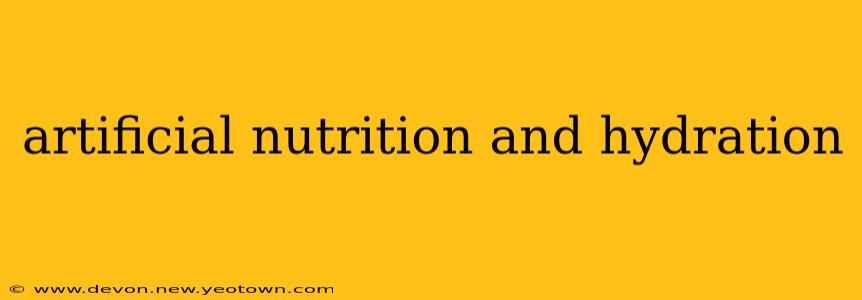The waning days of life often present complex ethical and medical dilemmas, none more so than the decision surrounding artificial nutrition and hydration (ANH). This isn't a simple yes or no answer; it's a deeply personal journey requiring careful consideration of the individual's wishes, their medical condition, and the potential benefits and burdens of continued ANH. This discussion aims to illuminate the complexities surrounding this sensitive topic, offering clarity and compassion to those facing these difficult choices.
What is Artificial Nutrition and Hydration?
Artificial nutrition and hydration refers to the provision of essential nutrients and fluids through medical means when a person is unable to consume them orally. This can involve nasogastric tubes (inserted through the nose into the stomach), gastrostomy tubes (inserted directly into the stomach through a small incision), or intravenous (IV) lines. While seemingly life-sustaining, the reality is far more nuanced.
What are the benefits of ANH?
The perceived benefit of ANH is straightforward: it keeps the body functioning. In some cases, particularly with temporary conditions impacting swallowing, ANH can allow for healing and a return to oral intake. However, the benefits become significantly less clear as the end of life approaches. For individuals with terminal illnesses, ANH may provide a few extra days or weeks of life, but not necessarily a better quality of life. The focus shifts from extending life to ensuring comfort and dignity.
What are the potential drawbacks of ANH?
The downsides of ANH in the context of end-of-life care are often overlooked. These can include:
- Discomfort: Tubes can cause irritation, discomfort, and even infections.
- Reduced Quality of Life: Individuals may experience nausea, vomiting, or abdominal distension. The invasive nature of ANH can disrupt peaceful passing.
- False Sense of Hope: ANH can create a false sense of hope, prolonging suffering and preventing the natural process of dying.
- Increased Medical Intervention: ANH often necessitates additional medical care, such as managing infections or tube complications.
Is ANH always necessary near the end of life?
This is a crucial question. ANH is not always beneficial, especially when the underlying condition is terminal and irreversible. In such cases, the burdens often outweigh the benefits, and focusing on comfort measures may be a more compassionate approach. It is essential to remember that death is a natural part of life, and providing comfort and dignity during this process is paramount.
When should ANH be considered?
ANH should be considered in situations where it can reasonably improve quality of life. This is more likely when the condition is temporary or reversible, such as after a stroke or surgery impacting swallowing. In cases of terminal illness, the decision is far more complex and needs careful assessment involving the patient (if capable), family, and medical team.
Who makes the decision about ANH?
The decision-making process should always involve the patient, if they have capacity to express their wishes. Advance care planning, including the completion of an advance directive or living will, can help guide decisions when the patient is no longer able to participate. The family and the healthcare team play crucial roles in collaborative decision-making, guided by ethical principles and a commitment to providing compassionate care.
How do doctors determine if ANH is appropriate for a patient?
Doctors take many factors into account. They consider the patient's overall health, prognosis, and quality of life. They will assess the potential benefits and burdens of ANH in the individual's specific circumstance. This process frequently involves discussion about the patient’s wishes and values, alongside the medical team’s professional judgment.
What are the ethical considerations surrounding ANH?
The ethical considerations surrounding ANH are multifaceted and demand careful deliberation. Balancing the sanctity of life with the importance of relieving suffering requires a holistic approach that respects individual autonomy, dignity, and the natural process of dying. Open and honest communication among all stakeholders is crucial for navigating these ethical complexities. Ultimately, the goal is to provide the most compassionate and appropriate care, respecting the patient's wishes and maximizing their quality of life during their final moments.
In conclusion, the decision regarding artificial nutrition and hydration is profoundly personal and necessitates a thoughtful, compassionate, and informed approach. It is not a medical decision alone, but rather a collaborative journey involving the patient, family, and healthcare team, guided by respect, compassion, and a shared commitment to ensuring the highest quality of life, even as life’s final chapter unfolds.

